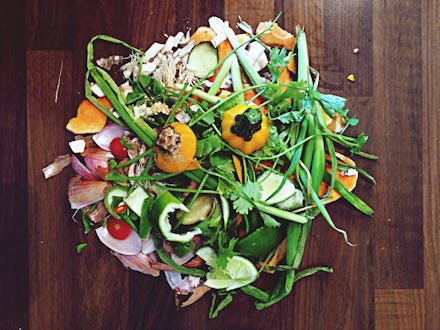Vermont became the first state to legally require composting

Composting is no longer a crunchy, niche practice — in fact, in one state, it’s the law. Vermont has become the first state to prohibit throwing out food scraps in the trash. Residents, grocery stores, and other businesses must now compost their rinds, eggshells, coffee grounds and other uneaten food items under a law that went into effect July 1.
Specifically, they need to store these scraps in a designated container, which they can then compost themselves at home, hire a company to pick up, or transport to a drop-off center, per the Huffington Post. The same goes for grass clippings and other green waste.
Vermont isn't interested in picking through neighborhood trash cans to enforce the law, nor does it have the resources to do so, Josh Kelly of the Vermont Agency of Natural Resources told Fast Company. Instead, they're basically using the honor system, which should work given that environmentalism is so deeply ingrained in the culture.
Although Seattle, San Francisco, and other major cities have implemented composting legislation, Vermont is the first state to do so, the Huffington Post explains. Adoption of it is expected to go pretty smoothly, given that 72% of Vermonters already compost, according to a University of Vermont study. Since much of the state is agricultural, most residents have been managing their organic waste for a while, compost consultant Cat Buxton told the Valley News.
The law could lessen Vermonters’ impact on the environment, per the Huffington Post. About a fifth of the trash they create is food waste, CBS affiliate WCAX reports. When it winds up in a landfill, it produces the greenhouse gas methane, which can, have a much greater impact than carbon dioxide over the long term, according to the U.S. Environmental Protection Agency. Meanwhile, the Food and Agriculture Organization of the United Nations estimates that food waste churns out about 3.3 gigatons of greenhouse gases annually around the world.
Wasting less food also makes financial sense. Thanks to the new law, Vermonters would be putting their compost “into a job-creating system,” Kelly told WCAX. Households could also save an average of roughly $370 per person every year by reducing food waste, according to the U.S. Department of Agriculture. Fingers crossed that an action as simple as adding an extra step to your dish washing routine, when done collectively, really will yield meaningful change.